-
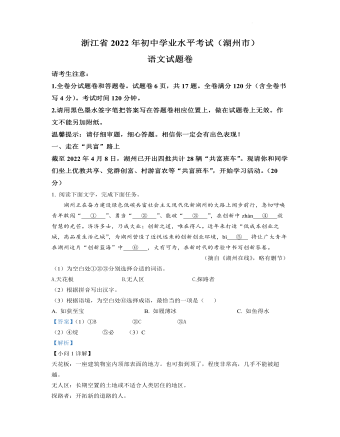
2022年浙江省湖州市中考语文真题(解析版)
地瓜没进过城,没见过世面,没受过励志教育。除了憨,它没别的见识和想法。被我那也没见过世面的爹爹埋没在土里。埋没了就埋没了。土里暖和,土里有营养。果然,这没见过世面的傻子,却长成了敦实汉子,地道的瓜。一排排黄瓜手扶着藤蔓做引体向上体操。
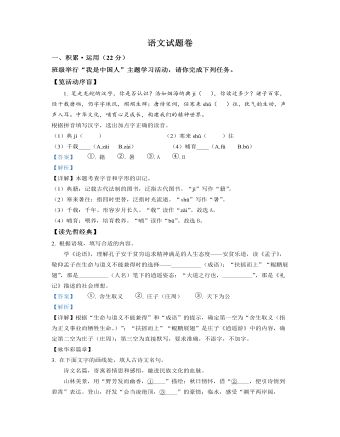
2022年浙江省杭州市中考语文真题(解析版)
“我会帮您拿包裹,给您买咖啡,帮您跑邮局……每一分钟,您都会看到我从这里进进出出。感受一下这双鞋子,桑德森先生,想象它会带着我跑得多么快。感觉到里面的弹簧了吗?感觉到鞋子内部在奔跑了吗?感觉到我能够飞快地干完这些事情不让您操一点心了吗?您悠闲地待在凉爽的店里,而我在满城跑!不过,到处跑的可不是我,而是鞋子。它什么地方都可以去!”
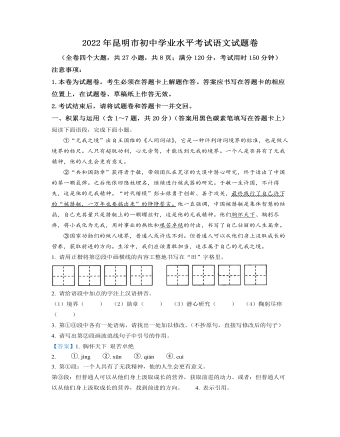
2022年云南省昆明市中考语文真题(解析版)
秦王谓唐雎曰:“寡人以五百里之地易安陵,安陵君不听寡人,何也?且秦灭韩亡魏,而君以五十里之地存者,以君为长者,故不错意也。今吾以十倍之地,请广于君,而君逆寡人者,轻寡人与?”唐雎对曰:“否,非若是也。安陵君受地于先王而守之,虽千里不敢易也,岂直五百里哉?”
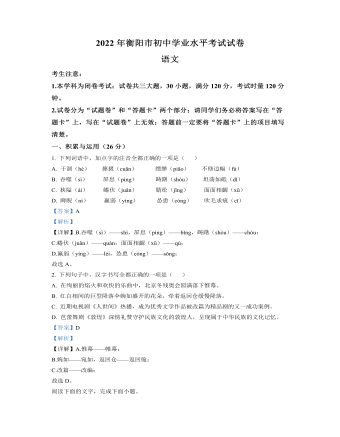
2022年湖南省衡阳市中考语文真题(解析版)
钱塘湖春行白居易孤山寺北贾亭西,水面初平云脚低。几处早莺争暖树,谁家新燕啄春泥。乱花渐欲迷人眼,浅草才能没马蹄。最爱湖东行不足,绿杨阴里白沙堤。
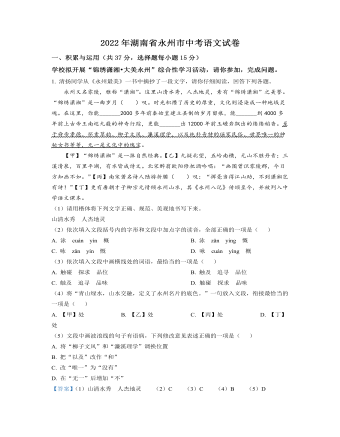
2022年湖南省永州市中考语文真题(解析版)
世有伯乐,然后有千里马。千里马常有,而伯乐不常有。故虽有名马,祗辱于奴隶人之手,骈死于槽枥之间,不以千里称也。马之千里者,一食或尽粟一石。食马者不知其能千里而食也。是马也,虽有千里之能,食不饱,力不足,才美不外见,且欲与常马等不可得,安求其能千里也?策之不以其道,食之不能尽其材,鸣之而不能通其意,执策而临之,曰:“天下无马!”呜呼!其真无马邪?其真不知马也!
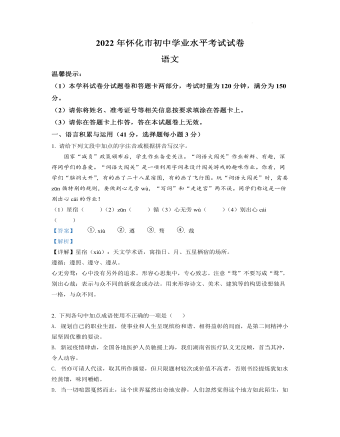
2022年湖南省怀化市中考语文真题(解析版)
【海外网2月21日电】2月20日,北京冬奥会正式闭幕,这届冬奥会为世界留下了独具特色的中国记忆,收获了众多好评,各国运动员持续发文为北京冬奥会点赞。“感谢、祝福”成了高频词。
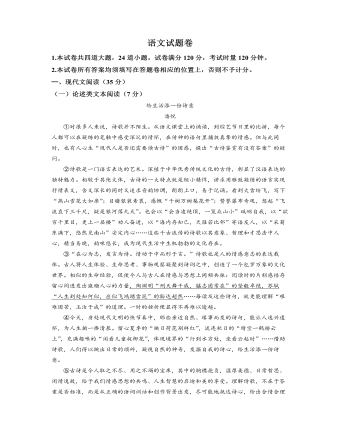
2022年湖南省湘潭市中考语文真题(解析版)
天在下雨,让原本就显得有些悲壮的远行更添了一份凄凉。雨不大,缠绵如丝,像是故土对他恳切地挽留,轻轻柔柔飘落在他的头发上,于发梢积出细小的雨珠连成网,将他的薄外套淋得到处是深浅不一的痕迹。天阴阴的,压下来,世界晦暗。透过这迷离的雨雾,他恍惚看到路上的行人向他迎面走来,汇成浩荡的人潮,或者说,是他感到自己正孤独地在人潮中逆流而行。
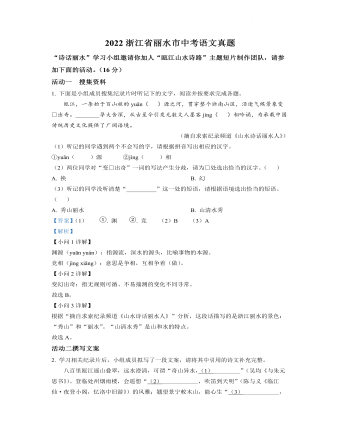
2022年浙江省丽水市中考语文真题(解析版)
莫言,原名管谟业,1955年生于山东高密,著名作家,2012年获得诺贝尔文学奖。据高密管氏族谱记载,高密管氏是从龙泉迁过去的。2010年,莫言到龙泉寻根问祖时表示,自己是高密管氏的第二十四代子孙、龙泉管氏的第三十六代子孙,祖上是北宋名臣、龙泉人管师仁。莫言曾题诗表达对龙泉之行的感想:“龙泉祖居地,山水呈瑞祥。诗成白云岩,根系石马岗。宝剑生紫气、青瓷吐幽光。惭愧我来晚,千里献心香。”
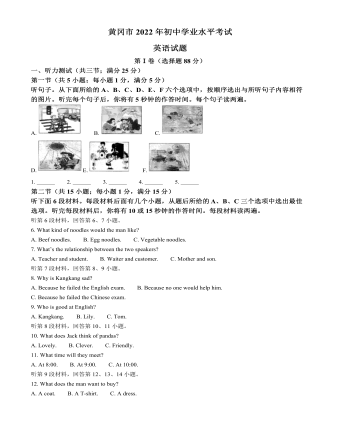
2022年湖北省黄冈市、孝感市、咸宁市中考英语真题(解析版)
When he was 12, his parents died. He was aloneand didn’t ____11____others. No one showed kindness to him. People always laughed ____12____ him. His only friend was adog named Bobby. He ____13____his dog enough to eat and drink, but he was a little rude(粗鲁的)to it sometimes.
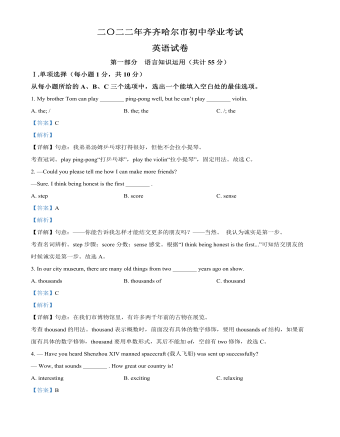
2022年黑龙江省齐齐哈尔市中考英语真题(解析版)
B: For 3 days. I expect togo there again.A: Lucky you. I had to stayat home. But I’m planning to travel to Mount Changbai.B: Oh, that’s a good place.I went there three years ago.
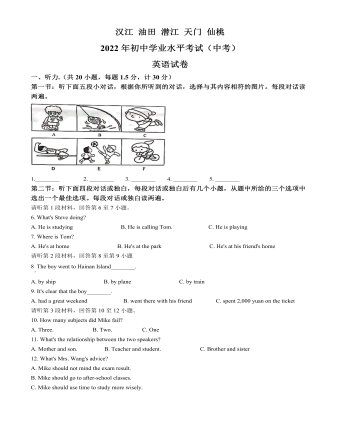
2022年湖北省江汉油田、潜江、天门、仙桃中考英语真题(解析版)
Penny’s family was very poor. Her father was asailor (水手).He earned very little money and was ____16____ away from home. Her mothercould not work ____17____she was often sick. One day.
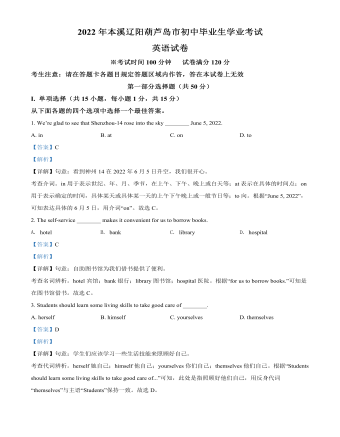
2022年辽宁省本溪市、辽阳市、葫芦岛市中考英语真题(解析版)
A bird went to look for happiness. On ___21___ way, she saw a flower, the flower was short ofwater, but his face was full of ___22___ .
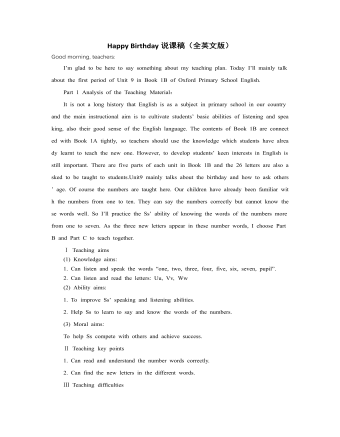
人教版新课标PEP小学英语三年级上册Happy Birthday(全英文版)说课稿
1. Do some exercise on the paper. There are four kinds of exercise here. The exercise 1 is to develop Ss’ ability of listening. Exercise 2 is to practice Ss’ ability of knowing the words. Exercise 3 is to develop Ss’ ability of speaking numbers and letters. Exercise 4 is to make Ss know the words and letters well. These exercises can consolidate the new knowledge from different styles of problems.2. Then tell Ss that we can sing the numbers like “ Do, re, mi, fa, so, la, ti, do” and let them listen to a song named “Do, Re, Mi”. Add some extra knowledge so that Ss will be glad to see that the numbers can be used in another way.Step 4 Homework1.Read the numbers from 1 to 7 and 7 to 1 five times.2.Read the letters “u, v, w” five times follow the tape.Reading is a useful way for the Ss of Grade One to practice the knowledge. Ask Ss to imitate reading from the tape in order to make Ss have a good habit of listening and let them have a better pronunciation.Step 5 Board writingI ‘ll put the seven numbers like a scale(音阶)as I’ll let Ss know that we can sing out the numbers. When it comes to listen to the song, I ‘ll draw a musical note on Bb. Unit 9 Happy birthday!sevensixfivefourthree U u V v W wtwo pupil five windowoneThat’s all for my class designing. Thank you for listening!
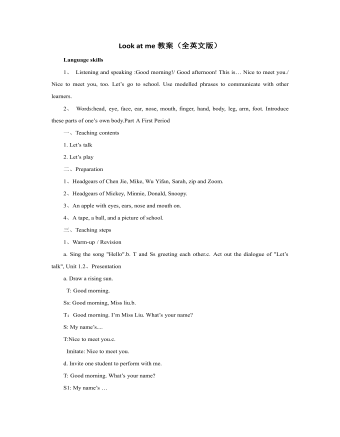
人教版新课标PEP小学英语三年级上册Look at me教案(全英文版)
3、Practicea. Nice to meet you. Nice to meet you,too.b. Perform the dialogue.c. Arrange the dialogue according to the pictures or sentence cards.d. Let’s play.A: Good afternoon,B. This is C. Hello, C! Nice to meet you.C: Nice to meet you, too.A,B: Goodbye!C: Bye!4、Assessment Workbook page 10Add-activitiesa. Listen to the recording and repeat.b. Make a dialogue according to "Let’s talk".Second Period一、Teaching contents1. Let’s learn Words:body, leg, arm, hand, finger, foot.1. Let’s do二、Preparation1、a puppet2、Cards of body, leg, arm, hand, finger and foot.3、headgear of a captain三、Teaching steps1、Warm-up/ Revisiona. Captain says to review "let’s do" of Part A.b. Perform the students their own dialogues.2、Presentationa. Learn to say "body, leg, arm, hand, finger and foot."b. Listen to the recording and repeat.c. Let’s do. Clap your hands. Snap your fingers. Wave your arms. Cross your legs. Shake your body. Stamp your foot.3、Practicea. Let’s draw a person.b. Let’s do. Point out which picture.c. Let’s do. Who responses faster.4、Assessment Workbook page 115、Add-activitiesa. Listen to the recording, repeat and act out.b. Say all the names of the body to your parents.Third Period一、Teaching contents1. Let’s check2. Let’s chant二、Preparation1、stationeries1、pictures of parts of Zoom
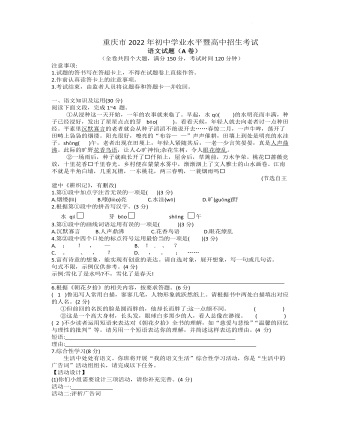
2022年重庆市中考语文A卷
这一天,阳光明亮,大鸟忽然觉得它的双脚可以抬起了。它十分激动地对冰山说:“我能飞了,我能飞了,我可以回家啦!”它扇动翅膀,飞了起来。可是,大鸟很快掉进了海水里。它好几天没吃东西,已经没有一丝力气。
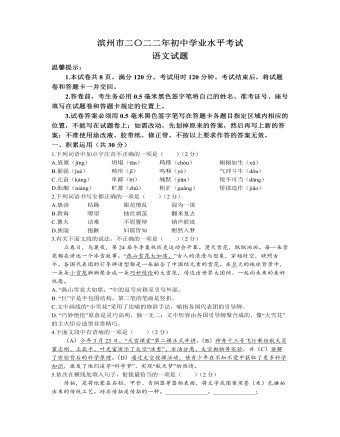
2022年山东省滨州市中考语文真题
【甲】大道之行也,天下为公。选贤与能,讲信修睦。故人不独亲其亲,不独子其子,使老有所终,壮有所用,幼有所长,矜、寡、孤、独、废疾者皆有所养,男有分,女有归。货恶其弃于地也,不必藏于己;力恶其不出于身也,不必为己。是故谋闭而不兴,盗窃乱贼而不作,故外户而不闭。是谓大同。
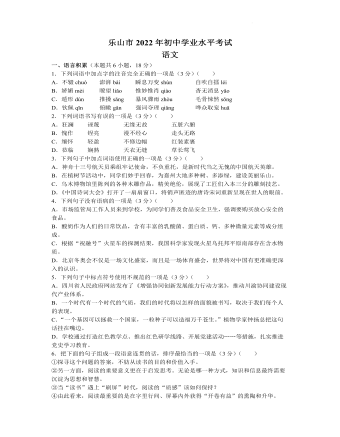
2022年四川省乐山市中考语文真题
中华民族拥有5000多年灿烂文明。弘扬中华美育精神,用美育涵养“美丽心灵”,不妨从教育引导年轻人热爱艺术开始。年轻人通过认识和理解中华大地上的优秀艺术作品,可以形成开阔的视野和包容的心态,增强文化自觉和文化自信。引导年轻人接近、欣赏中国文艺作品之美,有助于赓续优秀文化传统,增强做中国人的志气、骨气、底气。
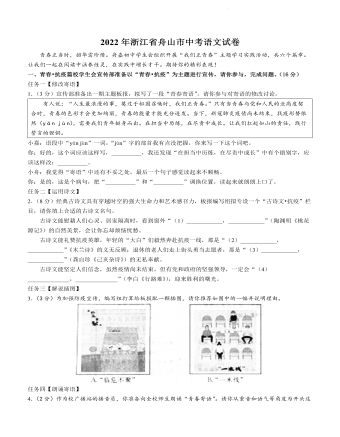
2022年浙江省舟山市中考语文试卷
生平所见之友,以穷以老而遂于衰颓者,十居七八。赤豹②,君子也,久居江东,得无有陨获③之叹乎?昔在泽州,得拙诗,深有所感,复书曰:“老则息矣,能无倦哉?”此言非也。夫子“归与归与”④,未尝一日忘天下也。故君子之学,死而后已。
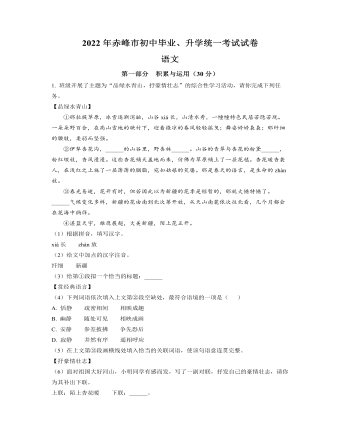
2022年内蒙古赤峰市中考语文真题(解析版)
题稚川山水【唐】戴叔伦松下茅亭五月凉,汀沙云树晚苍苍。行人无限秋风思,隔水青山似故乡。注:戴叔伦,唐代诗人,此诗作于作者宦游途中。
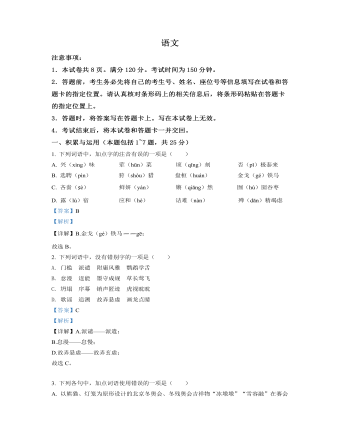
2022年内蒙古包头市中考语文真题(解析版)
夜来似闻某人素心,明日试往看之,入其门,窥其闺,见所谓某人方据案面南看一文书。顾客入来,默然一揖,便拉袖命坐,曰:“君既来,可亦试看此书。”相与欢笑。日影尽去,既已自饥,徐问客曰:“君亦饥耶?”不亦快哉!